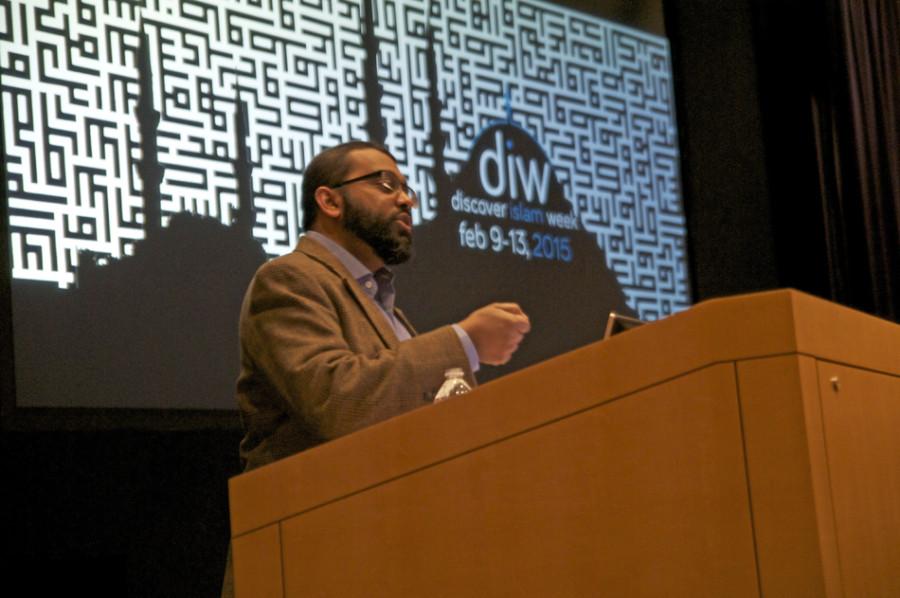Imam discusses freedom of speech at Discover Islam Week keynote event
Sophie Mann/The Daily Northwestern
Imam Shiekh Yasir Qadhi speaks during the Muslim-cultural Students Association keynote event that finalized the group’s annual Discover Islam Week. Qadhi spoke about the importance of freedom of speech and experiences of Muslims living in the Western culture.
February 13, 2015
Imam and religious scholar Sheikh Yasir Qadhi spoke about free speech and Islam on Thursday night at an event hosted by the Muslim-cultural Students Association.
About 100 people attended Qadhi’s speech, “Sticks and Stones: A Look at Free Speech and Faith,” the keynote event of McSA’s Discover Islam Week. Qadhi has an academic background in both Islamic and Western institutions, studying Islam in both a traditional, Eastern setting and in a Western academic setting, according to Muslim chaplain Ustadh Abdel Rahman Murphy, who moderated the event.
Qadhi discussed free speech in the West with regards to Islam, particularly in light of the Charlie Hebdo attacks in Paris and the murder of three Muslim students at the University of North Carolina at Chapel Hill. Donations were also collected to benefit the Ummah Foundation, a Muslim charitable organization.
The evening opened with a recitation from the Quran emphasizing the impact of speech, a common theme throughout the evening. Qadhi said he aimed to offer unconventional perspectives on Islam in the West.
“When we were structuring the Discover Islam Week, I guess we were looking for … a subject that would draw people in to learn about Islam from a different perspective from what they normally see,” said McCormick junior Athif Wulandana, vice president of public relations for McSA. “This is one of his strengths.”
In his speech, Qadhi first questioned the causes of terrorist attacks by radical Islamists. Religious violence is not inherent to the faith, nor is it a direct reaction to insensitivities such as illustrating the Prophet Mohammad, which is forbidden in mainstream Islam, Qadhi said.
“My religion is not why people are angry at America,” Qadhi said. “It’s not the Quran. It’s not the teachings of the Prophet. It’s because we as a superpower are involved in so many different things and so many hegemonic military activities across the globe that people are going to get angry at us and our allies when they feel their rights have been trampled. Now it is your job to do the research and decide if those concerns are legitimate or not.”
Qadhi drew parallels to the experiences of Muslims in the West and other minority groups, arguing Muslims have been oppressed, colonized and forced to accept Western norms while being prevented from practicing aspects of their religion. He said Muslims are more restricted in practicing their faith than other religions in the West.
Qadhi also challenged the notion of free speech in the West, arguing it does not truly exist in its fullest form. There exists a double standard as to what we can and cannot insult in the United States, the punishment for which is social ostracizing, which is worse than legal punishments, Qadhi said.
“We don’t pick and choose taboos,” Qadhi said. “Taboos are imposed on us.”
Qadhi also spoke about the role of Shariah law in the 21st century. He argued that while it should be reformed to fit modern times, it should be by those trained and qualified in Islamic law.
“You cannot bomb a country into civilization and democracy,” he said.
Qadhi finished the evening calling on both Muslim and non-Muslims to educate themselves.
“All I’m asking for is a little bit of sympathy and respect to understand this isn’t a freedom of speech issue,” Qadhi said. “This is a common sense decency issue.”
Samantha Schmidt, a Weinberg freshman who attended the talk, said the speech was thought-provoking.
“It made me think about free speech and religion in ways I hadn’t before,” Schmidt said.
Email: [email protected]
Twitter: @matthewchoi2018


